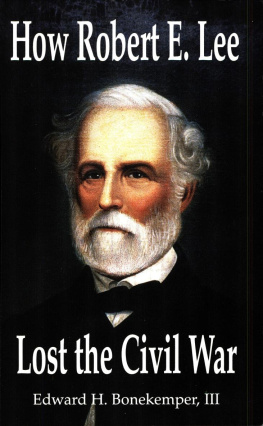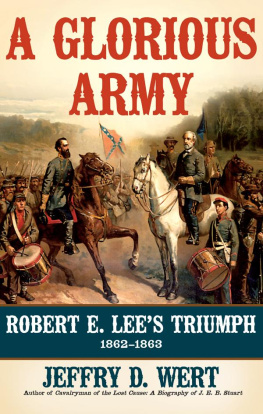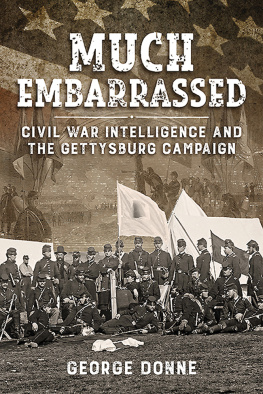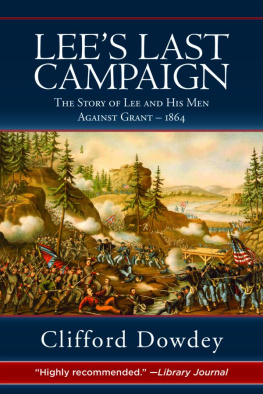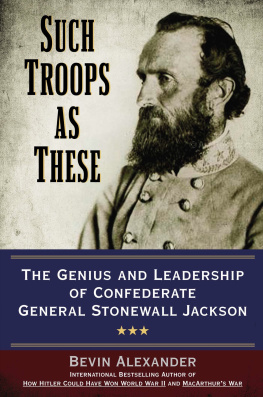Edward H. Bonekemper III - How Robert E. Lee Lost the Civil War
Here you can read online Edward H. Bonekemper III - How Robert E. Lee Lost the Civil War full text of the book (entire story) in english for free. Download pdf and epub, get meaning, cover and reviews about this ebook. year: 1999, publisher: Sergeant Kirklands Press, genre: Non-fiction. Description of the work, (preface) as well as reviews are available. Best literature library LitArk.com created for fans of good reading and offers a wide selection of genres:
Romance novel
Science fiction
Adventure
Detective
Science
History
Home and family
Prose
Art
Politics
Computer
Non-fiction
Religion
Business
Children
Humor
Choose a favorite category and find really read worthwhile books. Enjoy immersion in the world of imagination, feel the emotions of the characters or learn something new for yourself, make an fascinating discovery.
- Book:How Robert E. Lee Lost the Civil War
- Author:
- Publisher:Sergeant Kirklands Press
- Genre:
- Year:1999
- Rating:4 / 5
- Favourites:Add to favourites
- Your mark:
How Robert E. Lee Lost the Civil War: summary, description and annotation
We offer to read an annotation, description, summary or preface (depends on what the author of the book "How Robert E. Lee Lost the Civil War" wrote himself). If you haven't found the necessary information about the book — write in the comments, we will try to find it.
His theory: The North had the burden of conquering the South, a huge defensible area consisting of eleven states. The South only had to play for a tie and only had to wear down the northern will to win (as insurgents did against superior forces in the American Revolution, the Chinese Communist takeover of China, and the Vietnam War). Specifically, the South had to hold on to its precious manpower resources and convince the North to vote Lincoln out of office in 1864.
Instead, Lee unnecessarily went for the win, squandered his irreplaceable troops, and weakened his army so badly that military defeat became inevitable. Lees army took 80,000 casualties in his first fourteen months of command-the same number of troops he inherited when he took command. This crucial period of the war extended from the Seven Days Campaign, in which Lees army went on the suicidal offensive almost every day for a week; Second Bull Run/Manassas, where the final offensive charge was costly; the Antietam Campaign, which Lee initiated on his own and almost cost him his army; Fredericksburg, a lesson in slaughter that Lee failed to learn; Chancellorsville, the victory that wasnt; and finally the disastrous Gettysburg Campaign, in which he took his army on the strategic offensive and seriously damaged its future utility. With the Confederacy outnumbered four-to-one in white men of fighting age, Lees aggressive strategy and tactics proved to be suicidal.
Also noteworthy are Lees failure to take charge of the battlefield (such as the second day of Gettysburg), his overly complex and ineffective battle-plans (such as the Antietam and Seven Days campaigns), and his vague and ambiguous orders (such as those that deprived him of Jeb Stuarts services for most of Gettysburg).
Furthermore, the book describes how Lees Virginia-first myopia played a major role in crucial Confederate failures in the West. Too little attention has been paid to Lees refusals to provide reinforcements for Vicksburg or Tennessee in mid-1863, his causing James Longstreet to arrive at Chickamauga with only a third of his troops and none of his artillery, his idea to move Longstreet away from Chattanooga just before Grants troops broke through the undermanned Confederates at Missionary Ridge, and his failure to reinforce Atlanta in the critical months before the 1864 Presidential election.
Lees final failure was his continuing the hopeless and bloody slaughter after Union victory had been ensured by each of a series of events: the fall of Atlanta, the reelection of Lincoln, and the fall of Petersburg and Richmond.
This book also explores historians treatment of Lee, including the deification of him by failed Confederate generals, such as Jubal A. Early and William Nelson Pendleton, attempting to resurrect their own reputations and restore the pride of the South through creation of the Myth of the Lost Cause.
Readers and listeners are not neutral about this stinging critique of the hero of The Lost Cause.
Edward H. Bonekemper III: author's other books
Who wrote How Robert E. Lee Lost the Civil War? Find out the surname, the name of the author of the book and a list of all author's works by series.

